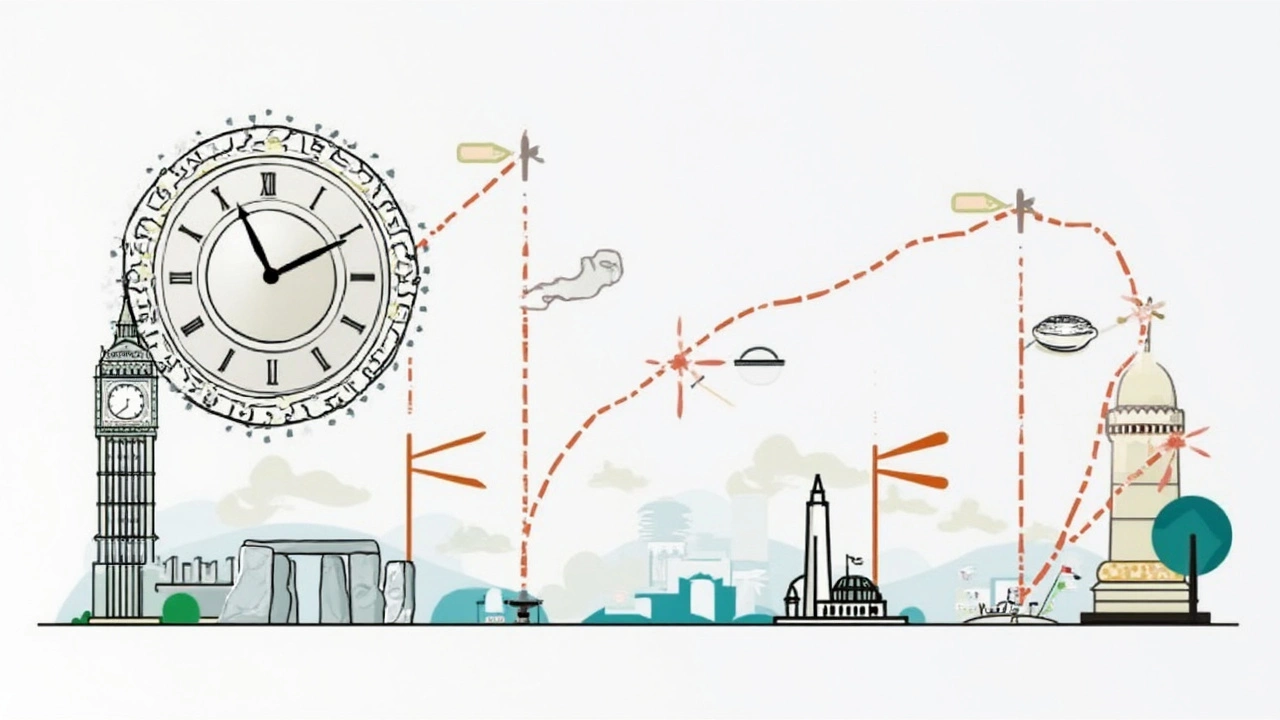Ever wondered if hotels drop their prices as the check-in date gets closer? You're not the only one. Trying to grab a great deal on a hotel room is like shopping on Black Friday—a mix of excitement and anxiety.
Hotels play a tricky game with pricing, often adjusting rates based on demand, competition, and even local events. It's the classic dance of supply and demand. But does this mean waiting will save you money?
The simple answer? Sometimes. But not always. When hotels anticipate low occupancy, they might cut prices to fill rooms. Yet, if there's a big conference or event, prices could spike last minute.
We'll dig into the nuts and bolts of how these pricing strategies work, debunk some myths about last-minute booking, and give you some savvy tips to snag the best deals. Because who doesn't want to save a few bucks without skimping on comfort?
- Understanding Pricing Models
- Last-Minute Booking Myths
- Tech-Savvy Ways to Save
- Disadvantages of Waiting
- Best Times to Book
Understanding Pricing Models
If you've ever booked a hotel, you might have noticed prices changing faster than your mood on a Monday morning. It's all about the mysterious world of hotel deals and pricing models. Hotels use dynamic pricing, a strategy where rates change based on various factors. This isn't just for hotels—airlines, ride-sharing services, and even some restaurants use it too.
What Influences Hotel Prices?
Several elements play a role in how hotels set their rates:
- Demand: High demand means higher prices. If there's a local event, prices can shoot up like a rocket.
- Seasonality: Peak tourist seasons often bring peak prices. Think summer holidays for beach towns, or winter breaks for ski resorts.
- Length of stay: Some hotels offer discounts for longer stays, encouraging you to stick around.
- Booking time: As your travel date approaches, hotels evaluate their occupancy. If they have many empty rooms, they might lower prices.
Bargain or Risk?
Sure, waiting might get you a better rate if you're betting on low occupancy. However, this isn't foolproof. Sometimes, it's better to book early, especially during high-demand periods when rooms fill up quickly.
The Role of Technology
Technology adds another layer to this puzzle. With specialized software, hotels can adjust their pricing in real-time, considering competitors' rates, market demand, and even weather forecasts! This tech-driven approach means rates can change multiple times daily.
Understanding these models helps travelers make informed choices. Whether you're seeking that last-minute steal or planning ahead for guaranteed comfort, being aware of hotel pricing strategies offers a better chance of nabbing great hotel deals.
Last-Minute Booking Myths
There's a popular belief that booking hotels at the last minute is the secret sauce for scoring unbeatable hotel deals. But is it true? Let's debunk some common misconceptions.
Myth 1: Prices Always Drop Last Minute
This one's a mixed bag. Yes, sometimes prices do drop to fill vacant rooms. But guess what? Sometimes they'll actually go up! If a hotel senses a spike in demand due to a local event, those prices can skyrocket in a blink.
Myth 2: Las-Minute is Better for Luxury Hotels
Many folks think that luxury hotels slash prices last minute to avoid unbooked rooms. The reality? High-end properties might offer discounts, but they're also the first to fill up during peak times. Plus, not all luxury hotels drop their rates since they rely on an upscale clientele willing to pay full price.
Myth 3: Room Types Stay the Same
Another gamble with last-minute booking tips is room selection. Sure, you might snag a deal, but you'll probably get whatever's left. Fancy an ocean view or a king-size bed? Play dicey, and you might get stuck overlooking a parking lot.
| Booking Timing | Average Savings |
|---|---|
| Last-minute | Up to 20% |
| Months in advance | Up to 30% |
As the table shows, you could save up to 20% by booking last minute. But planning months ahead could secure even bigger discounts, especially during low-demand periods.
- For critical bookings, like peak seasons or large events, booking in advance is smarter.
- Use apps or websites specializing in last-minute deals, but be mindful of room types available.
So, what's the takeaway? Letting the clock tick isn't always the golden ticket to travel savings. Consider your comfort needs and plan accordingly!

Tech-Savvy Ways to Save
In the digital age, booking a hotel isn't just about dialing them up or walking in. There's an entire online world dedicated to finding the best hotel deals. And if you're not using it, you're leaving money on the table. Let's look at some smart strategies to make your wallet happy.
Use Price Comparison Websites
Websites like Expedia, Booking.com, and Kayak have become a traveler's best friend. They allow you to compare hotel deals from different platforms, ensuring you get the lowest rate available. Don't just stick to one site. Cross-check across a few, as prices can vary.
Set Up Alerts
Many booking platforms offer price alerts. Enable them for your desired hotels, and you'll get notified as soon as the prices drop. This way, you won't miss out on that sudden cost cut for last-minute hotels.
Leverage Hotel Apps
Several hotel chains and booking platforms offer exclusive discounts to app users. Install the app, and you might find lower prices or additional discounts that aren't available on their websites.
Check Out Hotel Loyalty Programs
If you travel frequently, joining a hotel's loyalty program can be advantageous. Apart from earning points, members often receive exclusive discounts and perks like free stays and upgrades.
Consider Alternative Lodging Platforms
While mainstream platforms are great, don't forget about Airbnb or Vrbo. Sometimes, you can snag a cozy stay for much less, especially if you're flexible with your stay dates.
Utilize Booking Predictions
Some tools and apps can predict future room rates using fancy algorithms. Apps like Hopper can tell you whether to book now or wait for a possible drop. Just remember, they're not always perfect, but they're a neat guide.
By mixing traditional online booking methods with these tech-savvy tips, you can stretch your travel budget without compromising on comfort. So, go ahead and book smart!
Disadvantages of Waiting
Sure, waiting till the last minute sounds like a tempting hack, but it's a gamble that can backfire. Let's chat about why holding off might not be your best move when booking hotel deals.
No Room at the Inn
Ever tried booking a room only to find everything's full? It's frustrating. During popular events or peak times, hotels sell out fast. A last-minute hunt could leave you scrambling or settling for a place way below your standards or way over your budget.
Spike in Prices
While hotels sometimes slash rates to fill rooms, the opposite can also happen. If unexpected demand pops up, say, a surprise concert or conference, prices could rise dramatically. This isn't just a theory—data from leading travel sites indicates a price hike of up to 30% during peak events.
Limited Choices
When you're too close to the date, your favorite picks might already be off the table. You might end up stuck with rooms that are either less comfortable or far from your preferred location. It's a compromise in choice that savvy travelers prefer to avoid.
Missed Perks
Early birds often catch more than just the worm—they snag loyalty points, complimentary upgrades, and other perks. Last-minute bookings can mean missing out on these, diminishing your overall travel experience and sometimes even costing you more in the long run.
Diving into the tech side of booking might seem thrilling, but when it comes to reliable hotel deals, knowledge really is power. Be smart about when you book, and weigh the risks of waiting against potential savings.

Best Times to Book
When it comes to booking hotels, timing can be everything. While you might think weekends are the best time to snag a deal, that's not always the case. In fact, booking mid-week can sometimes be your secret weapon.
Experts suggest that travelers find the cheapest rates if they book hotels around 15 days before their stay. This means you should start hunting for those hot deals ahead of time but not too far out, as rates fluctuate.
Weekdays vs. Weekends
Generally, hotel prices drop from Sunday to Monday. Why? It's simple: the flurry of weekend travelers has left, and the hotels want to fill rooms quickly. Business-centric hotels in busy cities often have better deals on weekends when corporate bookings slow down.
Seasonal Booking Savvy
Think about your destination’s peak season. Booking in the off-season can lead to lower rates. But remember, a savvy traveler also considers special local events. That cozy mountain lodge might have a great rate in summer, but during the winter ski season, you're likely to pay premium prices.
Advance Booking Tips
- For popular destinations, aim to book 3-6 months in advance, especially during peak seasons.
- Use pricing alerts from travel websites to track price changes and book when prices dip.
Data Insights
Here's an interesting tidbit: a study by a well-known travel booking website found that booking on a Tuesday generally offers the best deals. We made a handy chart to illustrate average savings potential:
| Day | Potential Savings |
|---|---|
| Monday | 5% |
| Tuesday | 10% |
| Wednesday | 7% |
Of course, these aren't hard rules, but they're decent guidelines to follow for a better chance at savings. The trick is staying flexible and informed about market trends.
